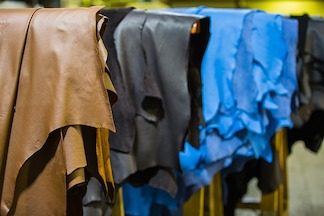Biobased Testing in the Leather and Tannery Industry
According to a 2022 business confidence survey by the International Leather Maker, the majority of tannery industry professionals are becoming increasingly conscious of the value of switching to biobased tanning chemicals as an alternative to chemicals sourced from fossil-carbon. Adopting fully or partially biobased tanning chemicals supports more sustainable and eco-friendly initiatives by reducing the carbon footprint of tanning companies and reducing the pollutants used and released during production.
Biobased chemicals do not affect leather performance. By making such a transition when it comes to chemical sourcing, leather companies will also appeal to consumers who are sustainably conscious and interested in renewable materials that have a lower impact on the environment. The decision to pursue more sustainable practices by tanners can be said to be both a beneficial and popular choice.

Carbon-14 Analysis of Tanning Chemicals
The next step for leather companies interested in heading toward a more biobased future is authenticating the natural composition of their tanning chemicals. Biobased testing via Carbon 14 analysis is a highly accurate method for determining the percentage of biobased chemicals versus petrochemicals in a product.
Carbon 14 is a naturally-occurring isotope present in all organic materials that can be measured via accelerator mass spectrometry (AMS). Raw leather itself is a 100% biobased material, therefore, measuring the amount of Carbon 14 in a leather component or finished product reveals the amount of fossil-derived chemicals versus biobased chemicals used. A completely biobased leather product will test as being 100% biobased, whereas a product that has been processed using fossil-carbon based chemicals will produce a lower percentage of biobased content.
Why Measure the Biobased Content of Tanning Chemicals
Biobased testing provides tanning chemical manufacturers and tanneries with documentation to prove biomass-based origin and support sustainability claims for products such as tannins, greases, waxes, coatings, and finished leather products. Testing also verifies tanning chemical suppliers’ claims that the chemicals are genuinely biobased, as these chemicals are more expensive than traditional petroleum-derived chemicals.
Data can be used to help companies and manufacturers stand up to environmental and ethical issues for which the leather industry is scrutinized and supports marketing claims that promote the value of real leather products over competition from biobased, recyclable, and vegan leather alternatives. Testing also provides documentation for clients and customers who are seeking more sustainable products.
Validation of the use of biobased chemicals, which are less toxic and more eco-friendly, can also allow companies to meet criteria for applications for the EU Ecolabel for footwear and the USDA BioPreferred® Program.
Reference: Tanners endorse the move towards biobased chemicals (September 2022)
Image Credit: Pixabay

This entry was posted on Thursday, December 15th, 2022 and is filed under Biobased Products .